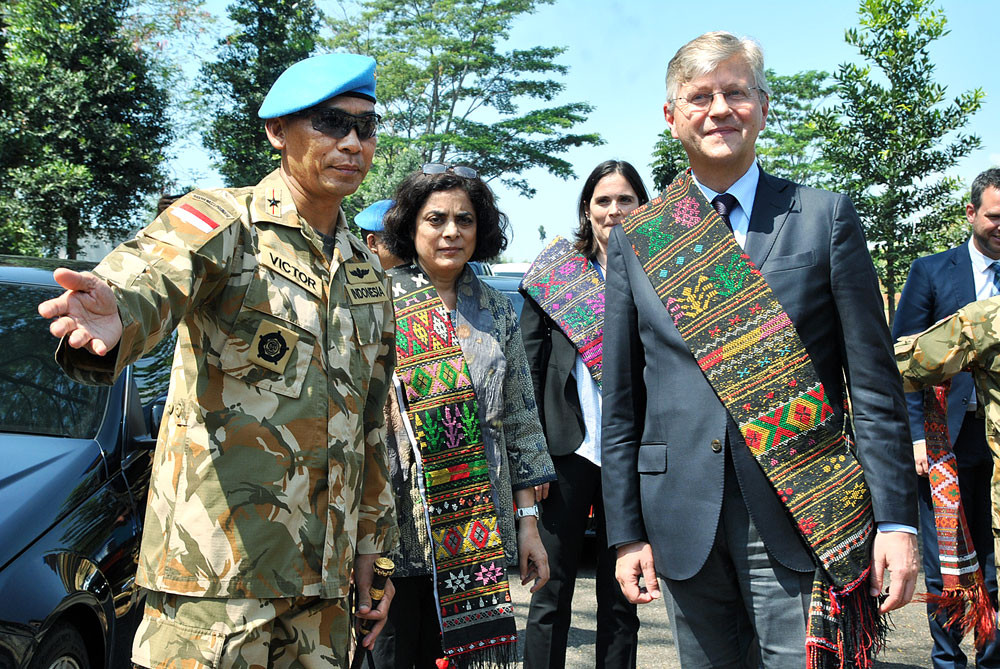Popular Reads
Top Results
Can't find what you're looking for?
View all search resultsPopular Reads
Top Results
Can't find what you're looking for?
View all search resultsDeath of Indonesian peacekeeper highlights dangers of field operations
Change text size
Gift Premium Articles
to Anyone
T
he recent death of an Indonesian peacekeeper from a surprise attack in the Democratic Republic of the Congo this week has served to highlight the vulnerability of serving in United Nations peacekeeping operations.
An Indonesian Military (TNI) officer died on Tuesday while another remains in intensive care after their convoy was ambushed by rogue militia allegedly from a neighboring country, which sparked a review process by Indonesia on the UN Organization Stabilization Mission in the DRC (MONUSCO).
According to a TNI situation report, an engineering company comprising 12 personnel and escorted by a battalion from Malawi was ambushed late Monday around 20 kilometers from the city of Beni in North Kivu province, just as they were returning to the central operation base.
The ambush killed Sgt. Maj. Rama Wahyudi, who was shot in the chest. Another Indonesian soldier, First Pvt. M. Syafii Makbul, was also injured during the assault and is currently under intensive medical treatment.
The attack was carried out by "suspected members" of the Allied Democratic Forces (ADF) – an armed group in eastern DRC with links to Uganda – according to a statement from the UN peacekeeping mission.
The incident had led Indonesia to conduct an evaluation on the existing patrol system at MONUSCO, said Brig. Gen. Victor H. Simatupang, the commander of the TNI’s Peacekeeping Mission Center.
“We will evaluate the security system that has been in place out so far, because the engineering company relied on the safeguards prepared by the UN,” he told The Jakarta Post on Wednesday.
“We see potential vulnerability. We are thinking about recommending the addition of monitoring tools such as drones in every movement.”
The company, comprising combat engineers (sappers) under Garuda Contingent XX-Q/MONUSCO, is tasked mainly to build infrastructure for the UN and the local government, and increasing troops was not an option due to a ceiling on the number of personnel set by the UN, Victor said.
“We are still carefully assessing the situation, but it is possible to make recommendations on how to reinforce our unit,” he said.
Foreign Minister Retno LP Marsudi took to Twitter on Tuesday to express her condolences over the death of the soldier.
“My deepest condolences on the passing of Sgt. Maj. Rama Wahyudi, an Indonesian peacekeeper with the MONUSCO mission in the DRC,” Retno tweeted.
Read also: Foreign minister offers condolences for Indonesian soldier killed in attack on MONUSCO
In New York, Indonesia's mission to the United Nations, together with France, delivered a UN Security Council press statement that strongly condemned the attack and called on the Congolese authorities to investigate the attack and bring the perpetrators to justice.
"The members of the Security Council condemned in the strongest terms all attacks and provocations against MONUSCO. They underlined that deliberate attacks targeting peacekeepers may constitute war crimes under international law," the council said in the statement.
Jean-Pierre Lacroix, the UN undersecretary-general for peacekeeping operations, also condemned the attack.
“This crime must not go unpunished. I reiterate my gratitude to Indonesia for its strong support to the UN and UN Peacekeeping,” he said on Twitter.
The ADF is a mainly Muslim movement that originated in neighboring Uganda in the 1990s and opposes the rule of Ugandan President Yoweri Museveni.
It moved into the DRC in 1995 and shifted its base of operations there, although it has not carried out attacks inside Uganda for years.
According to UN figures, it has killed more than 500 people since the end of October, when the Congolese army launched an offensive against it.
The ADF killed 15 UN troops at its base near the Ugandan border in December 2017, and seven in an ambush in December 2018.
Read also: Indonesian peacekeepers mostly die in accidents: Official
Since joining UN peacekeeping missions in 1957, Indonesia has seen at least 38 of its soldiers die in the field. Most of them, however, were killed in road accidents rather than from open conflict.
UN data shows that from 1948 to June 30, 2018, a total of 3,755 peacekeeping soldiers have died. Of them, 1,319 died by accident, 1,187 from illness, 1,001 because of malicious acts and the remaining in connection to other issues.










